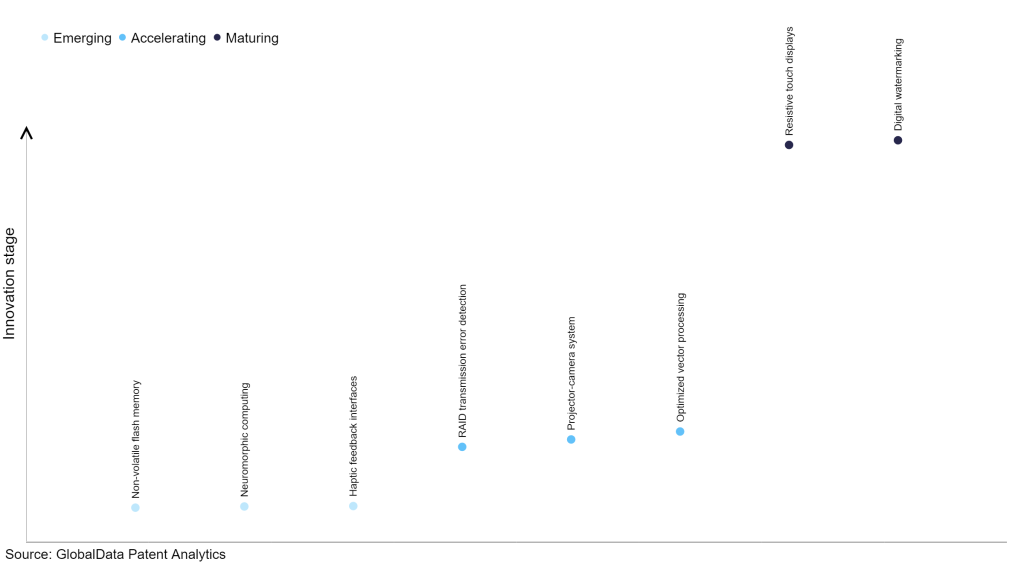The technology industry continues to be a hotbed of innovation, with activity driven by the increasing demand for high-performance computing (HPC) applications, artificial intelligence (AI) and machine learning (ML) advancements, and the need for faster data processing and analysis, and growing importance of technologies such as the development of advanced GPU architectures including NVIDIA‘s CUDA and AMD’s ROCm, which provide optimized parallel computing capabilities. Additionally, innovations such as tensor cores, dedicated AI capabilities, and improved power efficiency contribute to the growth of GPU accelerators, enabling organizations to achieve remarkable computing power, enhanced productivity, and accelerated insights in fields such as scientific research, data analytics, deep learning, and autonomous systems. In the last three years alone, there have been over 1.5 million patents filed and granted in the technology industry, according to GlobalData’s report on Technology Innovation: GPU accelerators. Buy the report here.
However, not all innovations are equal and nor do they follow a constant upward trend. Instead, their evolution takes the form of an S-shaped curve that reflects their typical lifecycle from early emergence to accelerating adoption, before finally stabilizing and reaching maturity.
Identifying where a particular innovation is on this journey, especially those that are in the emerging and accelerating stages, is essential for understanding their current level of adoption and the likely future trajectory and impact they will have.
185+ innovations will shape the technology industry
According to GlobalData’s Technology Foresights, which plots the S-curve for the technology industry using innovation intensity models built on over 1.6 million patents, there are 185+ innovation areas that will shape the future of the industry.
Within the emerging innovation stage, non-volatile flash memory, neuromorphic computing, and haptic feedback interfaces are disruptive technologies that are in the early stages of application and should be tracked closely. RAID transmission error detection, projector-camera system, and optimized vector processingare some of the accelerating innovation areas, where adoption has been steadily increasing. Among maturing innovation areas are resistive touch displays and digital watermarking, which are now well established in the industry.
Innovation S-curve for the technology industry

GPU accelerators is a key innovation area in technology
GPU accelerators are dedicated processors specifically designed to alleviate compute-intensive workloads from the central processing unit (CPU), enabling the CPU to concentrate on other tasks. These accelerators find applications across various domains, including deep learning, machine learning, gaming, and 3D graphics rendering.
GlobalData’s analysis also uncovers the companies at the forefront of each innovation area and assesses the potential reach and impact of their patenting activity across different applications and geographies. According to GlobalData, there are 160 companies, spanning technology vendors, established technology companies, and up-and-coming start-ups engaged in the development and application of GPU accelerators.
Key players in GPU accelerators – a disruptive innovation in the technology industry
‘Application diversity’ measures the number of different applications identified for each relevant patent and broadly splits companies into either ‘niche’ or ‘diversified’ innovators.
‘Geographic reach’ refers to the number of different countries each relevant patent is registered in and reflects the breadth of geographic application intended, ranging from ‘global’ to ‘local’.
Patent volumes related to GPU accelerators
Source: GlobalData Patent Analytics
Intel is a leading patent filer in GPU accelerators. The company’s patents are aimed at invention describing a mechanism for facilitating thread execution arbitration for thread scheduling relating to graphics processors at computing devices. A method of embodiments, as described herein, includes assigning priority levels to threads based on stall signals communicated from the one or more shared function units to one or more execution units of a processor including a graphics processor, and selecting a first thread to be scheduled and a second thread to be ignored based on the stall signals. The other prominent patent filers in the space include Samsung Group and Microsoft.
By geographic reach, Microsoft leads the pack, followed by Hailo and AT&T. In terms of application diversity, Intel holds the top position, followed by AT&T and Samsung Group.
GPU accelerators play a significant role in various industries by providing immense computational power and speeding up complex tasks. These accelerators utilize specialized graphics processing units (GPUs) to offload and process parallel computing workloads, delivering remarkable performance gains compared to traditional central processing units (CPUs).
To further understand the key themes and technologies disrupting the technology industry, access GlobalData’s latest thematic research report on Technology.
Data Insights
From

The gold standard of business intelligence.
Blending expert knowledge with cutting-edge technology, GlobalData’s unrivalled proprietary data will enable you to decode what’s happening in your market. You can make better informed decisions and gain a future-proof advantage over your competitors.







